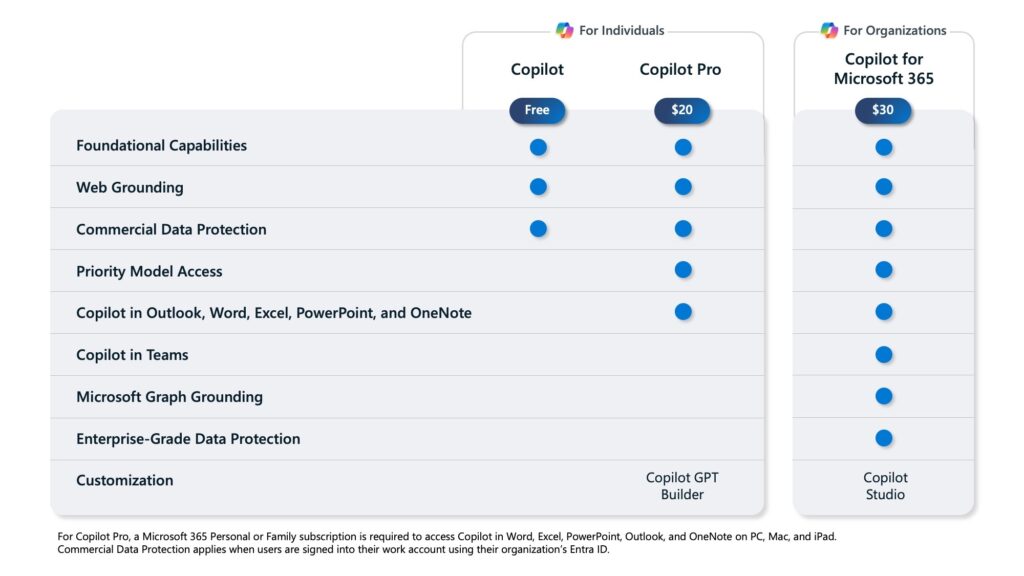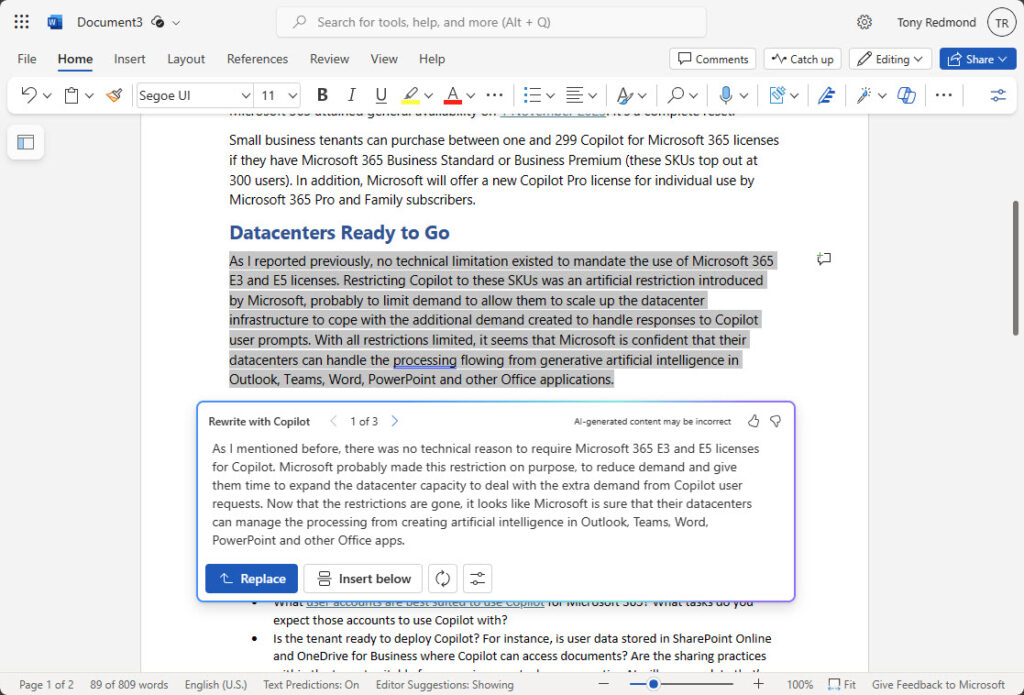Office 365 E3 and E5 Tenants Can Now Use Copilot With No Minimum Purchase Requirement
In the past, I have been critical about the way Microsoft limited the ability for enterprise tenants to purchase Copilot for Microsoft 365 to holders of Microsoft 365 E3 and E5 licenses. In a January 15 article posted to the Microsoft blog, Yusuf Mehdi, Consumer Chief Marketing Officer, announced the removal of that restriction and more. Organizations with Office 365 E3 and E5 licenses are now eligible to use Copilot for Microsoft 365 (they still need to buy Copilot licenses at $30/user/month). In addition, Microsoft has dropped their requirement that customers must buy a minimum of 300 Copilot licenses that existed since Copilot for Microsoft 365 attained general availability on 1 November 2023. It’s a complete reset.
Small business tenants can purchase between one and 299 Copilot for Microsoft 365 licenses if they have Microsoft 365 Business Standard or Business Premium (these SKUs top out at 300 users). In addition, Microsoft will offer a new Copilot Pro license for individual use by Microsoft 365 Pro and Family subscribers. Figure 1 shows the graphic Microsoft is now using to illustrate the “Copilot family.”

Datacenters Ready to Go
As I reported previously, no technical limitation existed to mandate the use of Microsoft 365 E3 and E5 licenses. Restricting Copilot to these SKUs was an artificial restriction introduced by Microsoft, probably to limit demand to allow them to scale up the datacenter infrastructure to cope with the additional demand created to handle responses to Copilot user prompts. With all restrictions limited, it seems that Microsoft is confident that their datacenters can handle the volume of work flowing from features using generative artificial intelligence in Outlook, Teams, Word, PowerPoint and other Office applications.
Don’t Rush to Embrace Copilot Without Thought
Although the news is very welcome, don’t assume that just because your tenant is now eligible to run Copilot for Microsoft 365, it’s now the time to purchase licenses. Microsoft would obviously welcome a surge of purchases from tenants, but it’s still important to ask questions like:
- What advantages do we expect to get from Copilot for Microsoft 365? What Copilot features are we most interested in?
- How can we measure the impact on user productivity to assess if the licensing spend is justified?
- What user accounts are best suited to use Copilot for Microsoft 365? What tasks do you expect those accounts to use Copilot with?
- Is the tenant ready to deploy Copilot? For instance, is user data stored in SharePoint Online and OneDrive for Business where Copilot can access documents? Are the sharing practices within the tenant suitable for an environment where generative AI will use any data that’s available to it? Are sensitivity labels used to protect confidential information and do the label permissions need adjustment to cope with Copilot?
My experience of using Copilot is mixed. It delivers impressive results when given a limited set of data to work with, such as summarizing points from a Teams meeting, an email thread, or a Word document. Copilot can help people to rewrite text to make it clearer and more precise (Figure 2). Copilot can generate text to help people start documents like project reports, but hallucinations can sneak in. I’ve dealt with several examples of text that was just plain wrong and some content that I couldn’t explain the source used by Copilot.

I freely admit that some of the issues I have met could be due to user error and some due to the reference documents I chose for Copilot to work with. It’s also true that we are at the start of the generative AI era, that software will improve over time, and we’ll all become smarter at leveraging new tools like Copilot. However, I would not rush to buy Copilot licenses unless I was very sure that the organization was ready to take advantage of the investment. Microsoft marketing information tells a merry story about how organizations have benefited from Copilot and the reluctance of users to hand it back, even for a pizza dinner. But making decisions based on marketing information is not a strategy for success.
All Clear to Run a Comprehensive Copilot Trial
The great thing about Microsoft’s announcement is that customers now have the chance to run a real-life Copilot for Microsoft 365 pilot for a small group of handpicked users intended to represent the overall user community. Instead of being faced with a minimum investment of $108,000 ($30/user/month for a year), the cost of a trial is much lower, and that’s goodness.
It’s definitely worthwhile running a trial. If you don’t, you won’t know if Copilot for Microsoft 365 is suitable for the kind of work done inside your tenant. The experience gained through a well-designed and conducted trial will give you hard data to make the decision to deploy or pass for the rest of the tenant. Microsoft’s announcement has certainly made 2024 even more interesting…
TEC Talk: Migrating T2T with Native Tools
 Join Mike Weaver’s Free Webinar on Jan. 18th @ 11 AM EST.
Join Mike Weaver’s Free Webinar on Jan. 18th @ 11 AM EST.




It seems like “Office 365 E3 and E5 are now eligible to support Copilot for Microsoft 365. ” is in the US only
Hmmm… I use Copilot for Microsoft 365 with Office 365 E5 and I am based in Ireland. Can you cite a source for this assertion?
Will be interesting to compare in the future, the impact to businesses that will never be able to afford to buy premium bundles against the ones that buy and implement them into thier work processes.
In addition, this is what I observed:
1) There’s no trial available for Copilot for Microsoft 365 licenses
2) You can’t pay monthly, only prepaid for 1 year is available: $30*12m=$360 user/year
1. No trial is available at present, but give Microsoft time. The case against a trial is that turning on Copilot involves building and maintaining the semantic index. It’s not like Teams Premium where the trial simply enables some features.
2. Microsoft usually looks for a yearly commitment for licenses.
What recent changes has Microsoft made to the licensing restrictions for Copilot for Microsoft 365, as mentioned in the article dated January 15, and how do these changes impact eligible organizations? regard Telkom University
As the article says, Office 365 E3 and E5 are now eligible to support Copilot for Microsoft 365. You still need to buy Copilot for Microsoft 365 licenses. That requirement hasn’t gone away.